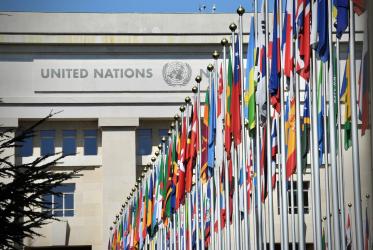The World Council of Churches' (WCC) central committee has urged religious and political leaders to promote the return of displaced persons, co-existence and reconciliation in the divided region of Kosovo as the basis of any long-term settlement.
"The realization of a multi-ethnic and multi-religious Kosovo must begin, realistically, with peaceful co-existence," a minute adopted by the central committee stated.
The future political status of the region, a part of Serbia that came under United Nations rule in 1999 following a period of civil conflict and military intervention by NATO forces, is being decided in international negotiations this year.
The committee also requested local religious leaders in Kosovo to make every effort "to foster healing and harmonious relations in a society that has been torn asunder by violence, hatred and conflict," and committed the Council to work closely with its member churches to monitor human rights and religious freedom in the region.
Following the 1999 conflict, most non-Albanians, predominantly Christian Serbs, fled the Albanian-majority region, and nearly 150 historic churches were destroyed.
The WCC governing body appealed to the international community, as well as all relevant authorities, to offer guarantees to allow a return of all persons displaced by conflict, and to foster co-existence in still-divided communities.
"On this basis the international community can implement a sustained effort toward an enduring and just peace, while securing freedom and tolerance in a truly multi-ethnic and multi-religious Kosovo," the minute adopted by central committee stated.
The central committee also gave attention to the rights of religious minorities in this predominantly Muslim region, and to the preservation of the exceptional cultural and religious architecture and heritage of Kosovo.
The WCC led ecumenical efforts in the 1990s, along with the Conference of European Churches and several ecumenical agencies, to foster efforts for peace and reconciliation in war-torn former Yugoslavia. The minute expressed particular support for the commitments of a recent interfaith conference on peaceful co-existence and dialogue hosted by the Serbian Orthodox Church, in cooperation with Norwegian Church Aid and the World Conference on Religion and Peace.
Related Links:
Full text of the Minute on Kosovo will be available later on Tuesday, 5 September, on the WCC website:
www.oikoumene.org/en/resources/documents/central-committee/geneva-2006/reports-and-documents.html
More information on the WCC Central Committee meeting is available on the WCC website:






